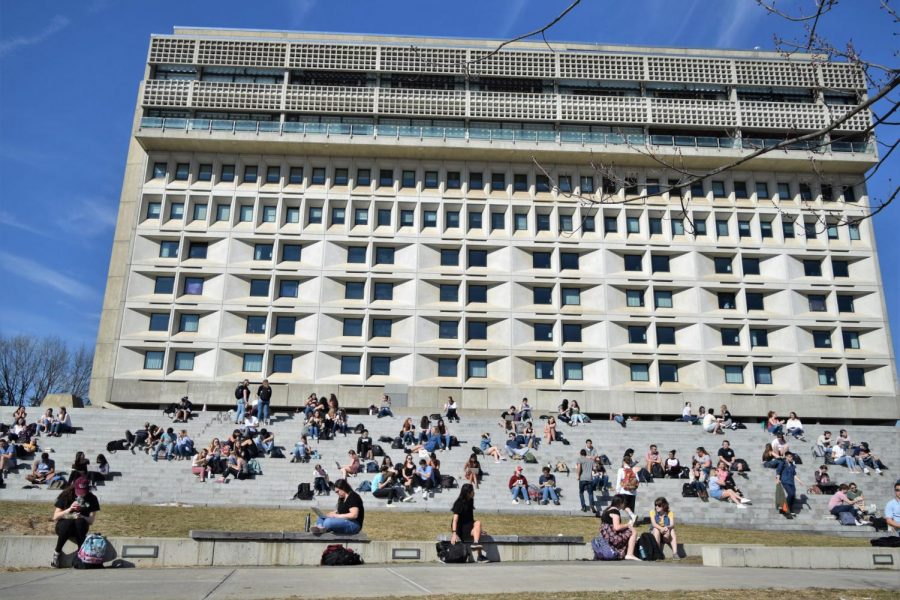The court room came to the basement of the Campus Center as the University of Massachusetts hosted a sitting of a three-member panel of the Massachusetts Appeals Court on Tuesday morning.
The sitting was presided over by appellate court justices William J. Meade, Mary T. Sullivan and Edward McDonough. The justices heard six cases that were previously decided at lower courts prior to appeal. In each case, the representative of the appellant was given 15 minutes to present an argument and the representative of the appellee was then given 15 minutes to respond in a counter-argument.
The first case, Commonwealth v. Michael M. St. Pierre, Jr., was based on an initial court ruling, revolving around an alleged assault on victim Julie Doty. The court found St. Pierre not guilty to one count of strangulation and one count of assault and battery; however, the court did find him guilty on a separate assault and battery charge. St. Pierre sought an appeal on the basis that the prosecution’s closing arguments infringed upon St. Pierre’s fifth amendment right to refuse to testify.
“I’ll suggest that this is the most egregious issue with the closing argument, and this potentially rises, I submit, to a constitutional error and a violation of the fifth amendment of the U.S. Constitution,” said Laurence Cohen, esquire, St. Pierre’s attorney. “A prosecutor improperly infringed upon Mr. St. Pierre’s fifth amendment right not to testify by repeatedly referencing Mr. St. Pierre’s view or side in the closing argument.”
Cohen also cited the prosecution’s explanation of a lack of credibility in Doty’s testimony to post-traumatic stress disorder as “improper commentary” due to no expert testimony regarding PTSD being conducted in the trial.
In his counter-argument, Joseph Coliflores, the attorney representing the Commonwealth, explained that while the prosecution’s closing argument may have been “unartful,” the reference to PTSD was still a fair response to any claims against Doty’s credibility in her testimony.
Coliflores said, “Ms. Doty offered her own statement that she had PTSD into [the trial], so it is a fair inference for the prosecutor to argue that subject to PTSD and how it interacts, that she may be forgetful.”
The second case, Commonwealth v. Harold W. Ross, was brought to court by Ross and his attorneys in an attempt to reverse or vacate an assault and battery with a dangerous weapon and a vandalism conviction based on numerous violations in Ross’ trial in a Pittsfield court. In the appellant brief for the case, such violations include a refusal to allow Ross to argue self-defense against his charges and the jurors had demonstrated bias in the case, which John G. Mateus, esquire, argued prevented Ross from receiving a fair trial.
In response, Megan Lynn Rose, the attorney representing the Commonwealth, argued there was not a late request for an appeal; thus, passing the deadline for an appeal and taking the case out of the jurisdiction of the appellate courts.
Jake Nichols v. Natick Chief of Police was the next case discussed. It followed Natick Police Chief James G. Hicks’ refusal to grant a firearm license to Nichols based on Nichols’ admission to a drug addiction. David A. Deluca, esquire, the attorney representing Hicks argued this refusal was justified.
Nichols’ attorney, Jason A. Guida responded, claiming that Nichols was on the path to recovery and that certain precedents limit the chief’s discretion in granting firearm licenses.
Guida said, “…the court said in the 2013 Simkin decision that the chief’s discretion is not unlimited in suitability determination.”
Following a short recess, the court sitting resumed with the case of National Lumber Company v. Town of Hopkinton and another, where, according to the appellant’s brief, “National’s claims include a request for declaratory relief and damages related to Royal’s purchase of an allegedly delinquent real estate tax receivable…”
Another case, Bunker Hill Insurance Company v. G. A. Williams & Sons referred to a case where oil had spilled on Shirley Gilbody’s property and Williams claims that Bunker Hill unjustly received “duplicative damages” following the spill.
The final case, Milton Lopez v. Mansour M. El-Werfalli, saw appellant Lopez, who had filed a complaint against his landlord El-Werfalli following a fire on his property, claim that El-Werfalli’s counterclaim of an Abuse of Process violation should have been considered a SLAPP claim and subsequently dismissed by the district court that initially decided on this case.
Damian Boz, esquire, El-Werfalli’s attorney, refuted the appellant’s argument by claiming that Lopez was seeking damages he was not entitled to due to a lack of appropriate insurance coverage.
Boz said, “The underlying facts of this case really revolve around a commercial lease agreement, where there were insurance requirements that were not maintained by the appellee.”
“Any claim that would be brought would certainly result in an Abuse of Process because the fact really is, they’re looking to bring that claim to force some sort of settlement they are clearly not entitled to when our damages are several $100,000 as a result of the fire for a failure to maintain the proper insurance coverage,” he added.
The justices will make final decisions on the appeals at a later date.
Will Mallas can be reached at [email protected] and followed on Twitter @willmallas.














